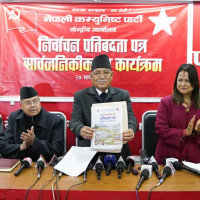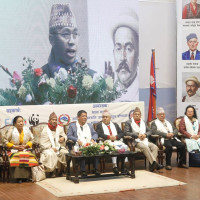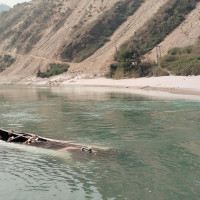- Wednesday, 11 February 2026
Teachers and doctors voice discontents through protests
Kathmandu, Sept. 24: Article 31 of the Constitution of Nepal ensures the rights relating to education and Article 35 ensures the rights relating to health. As per the Constitution, every citizen shall have the right of access to basic education and free basic health services.
However, the citizens have been restricted from utilising these basic rights several times in the recent past. Moreover, the restriction has been more recurrent at a time when Nepal is a federal, democratic and republican country.
Recently, around 150,000 community (government) school teachers hit the streets on Constitution Day on September 20. Over 27,000 community schools were closed for two days, and over five million students were unable to attend regular classes.
“We were told that the school was closed today because teachers were in protest. It is nice to have unexpected holidays,” said children playing football on the premises of the Koteshwor Mahadevsthan Temple in front of Koteshwor Saraswati Secondary School on Thursday.
However, the children stressed that they did not enjoy long holidays. “It feels great to be in the class with friends, and study gets fun. Everyone says I need to study more, so I try studying harder,” said Rohit, a 15-year-old who had come to Koteshwor at his maternal uncle’s house on Thursday as his school in Kirtipur was closed due to teachers’ protest.
It has been around five years since the schools across the country stopped being closed due to bandhs by political parties. Nevertheless, the schools have been closed on different dates during the same period. However, the closure has mostly been a result of protests by teachers, employees and private school operators.
Meanwhile, teachers and school operators argued that they were compelled to close educational institutions and take to the streets owing to unfavourable laws and unequal treatment by the state.
The recent protest was against the School Education Bill tabled in the Lower House of Representatives on September 13. The protest was led by the Nepal Teachers’ Federation (NTF). The federation had issued a statement demanding amendments in more than 17 provisions of the proposed Bill with clarifications.
“The Bill came to replace the Education Act, 1971. However, the Bill failed to motivate the stakeholders. It needs amendments for the betterment of teachers, students and the overall basic education sector,” said Kamala Tuladhar, chairperson of the NTF.
According to the agitating teachers, the major demands include not operating completely under the local government, upgrading temporary teachers into permanent ones and providing pension facility under the previous law, among others.
The protest that started on Constitution Day was said to be indefinite until the demands were met.
But an agreement reached between the teachers’ representatives and a high-level government team comprising Deputy Prime Ministers and ministers Friday evening to address the demands led the NTF to call off the protest.
Thousands of teachers from all 77 districts of the country had arrived in the capital city of Kathmandu for the protest by closing the schools. They will reportedly return and the schools are expected to open from Sunday.
However, temporary and relief quota teachers have said that their demands were not addressed in the agreement inked between the NTF and the government. Around 40,000 teachers are still in agitation, and hundreds marched in Kathmandu on Saturday saying their protest was still on.
While private schools did not join the street protest of government teachers, they almost had. They were in the protest in August when the government decided to table the Bill for the first time. Private schools had warned of closing schools and protested on the streets showing strong dissatisfaction against the provision of turning schools into a non-profit organisation (guthi) mandatorily.
They were assured by the Prime Minister himself and the protest was called off. When the government tabled the Bill on September 13, the private schools’ demand was met and the provision was amended making the need of turning a school into a non-profit optional.
According to teachers associated with Private and Boarding Schools’ Organisation Nepal (PABSON), they did not have to protest after the government amended the provision and made the law private school-friendly.
Earlier, government school staffers had also staged protests citing disparity by the state. They had also warned of closing the schools as the last resort. An agreement was reached before the deadline to resort to the final option.
“Every sector requires laws for effective service delivery and proper regulation. However, those laws should be formulated in consultation with concerned stakeholders. But it seems that the recent education Bill was formulated without reflecting upon the demands and necessities of the teachers and schools,” said Kedar Bhakta Mathema, a former vice chancellor of Tribhuvan University.
Mathema stressed that the concerned stakeholders, especially of the fundamental rights sector, should be in favour of the laws formulated by the government. “The major need is to end politics and favouritism in the fundamental rights sector,” Mathema told The Rising Nepal.
Health sector in similar boots
The recent teachers’ protest was a historic one since the government school teachers, who have been the backbone of several landmark movements in Nepal’s history, hardly protested against the state. However, the health sector, both private and state-owned, which stayed open for patients even in the most difficult times, has also been led to close the institutions due to either dissatisfaction with the laws or disparity by the state.
On September 17, government and private doctors led by their umbrella organisation, the Nepal Medical Association (NMA), shut down services of the outpatient departments (OPD) in health centres across the country affecting tens of thousands of patients suffering from different ailments.
The shutdown was a protest demanding action against individuals who assaulted two doctors – Bikash Thapa and Prashant Bidari – employed at the Hetauda-based Sancho Hospital on September 13.
In a similar incident, doctors had warned of shutting OPD services on February 12, 2023. However, in this case, doctors had been assaulted by police officers.
The NMA had decided to close health centres, except emergency services, on February 12 after some doctors of the National Trauma Centre were charged with batons when they wanted to cross an alley connecting Bir Hospital during a convoy of then President Bidya Devi Bhandari.
The government had reached an agreement with the doctors and assured amending provisions relating to convoys of VVIPs to stop affecting the general public. Since March, after the appointment of Ramchandra Paudel as the third President, VVIPs’ convoy, including that of the President, has been less restraining for the public.
A similar agitation also occurred when a doctor of the Karnali Academy of Health Sciences was beaten by the institution’s employee.
According to NMA officials, health workers are the ones who are most cautious regarding any individual’s health and understand the importance of unobstructed health services.
“We have to resort to the streets when the government does not address our demands put forth decently. The demands need to be met for a quality environment to work. Shutting down services is our last resort,” said Dr. Sanjeeb Tiwari, general secretary at the NMA.
Doctors have also shut services multiple times when the hunger strike of Dr. Govinda KC, who has staged over 20 hunger strikes, lasted for more than a week after the government showed no concern in addressing his demands, ending his hunger strike and saving his life.
Most hunger strikes of Dr. KC have been the result of the delay in bringing a law for the overall medical education sector. However, despite the efforts, some provisions were amended and endorsed by the state in 2019 by going against the previous agreements and assurances with Dr. KC.
Resident doctors have also shut services on multiple occasions demanding stipends as per the law and an end to the forceful need of working for more than 24 hours without rest and sleep.
In one of the major protests by the doctors, the health centres shut down OPD services for more than three days in September 2017 after the government introduced the Criminal (Code) Act.
Thousands of doctors wearing white coats had marched from Maitighar to New Baneshwor for a number of days in September 2017 demanding amendments to the law. The law had a provision allowing the family of an individual who died during treatment to file a criminal case against the medical personnel without any time limit.
Thousands of health assistants had also hit the streets in January 2019 warning of resignation en masse. They demanded to appoint the chiefs of health posts based on academic qualifications. Hundreds of health assistants from across the country had gathered in Kathmandu to stage a protest.
“There is a need to understand why doctors close services and come outside on the streets. The government needs to be more welcoming to the suggestions from stakeholders while bringing laws, policies and programmes. It is easy to create a healthy medical sector, even a quality education sector, if everyone coordinated for the interest of the country and its people,” said Dr. Bhagawan Koirala, a senior cardiothoracic surgeon.
Dr. Koirala, who is also the chair of the Nepal Medical Council, urged the authorities to ensure the safety of health personnel.
State’s response
Despite multiple protests, the government and the agitating sides mostly reached an agreement at the earliest since the protest’s effect led other stakeholders to mount more pressure on the government.
However, the failure to implement the agreements has also been common. For instance, Dr. KC is still warning to stage a hunger strike as the government has failed to meet his demands agreed upon in the past.
“Doctors and teachers working in government institutions are also civil servants like us. They have the freedom to work.
However, we are put under politics. We have to work as per the minister and the ruling party’s interest,” echoed three secretary-level officials in the Health Ministry and Education Ministry.
Talking to The Rising Nepal under the condition of anonymity as they were speaking against their leadership, the government secretaries, however, acknowledged the activeness in holding talks and addressing the concerns of the protestors.
“It is much easier and convenient if the leadership heard the concerns, even of those in the minority, before amending or formulating laws,” said a secretary of the Health Ministry.
Informing about the agreement between the teachers and the government on Friday, Minister for Communication and Information Technology Rekha Sharma, who is also the government spokesperson, said that such problems should be solved by means of dialogue, not protest.
Responding to the reservation of temporary and relief quota teachers on the agreement, Minister Sharma said, “It is not right to continue the protest because we have agreed to an extent allowed by our constitution’s and prevailing laws’ provisions. There is always room for improvement through discussions.”








-square-thumb.jpg)







